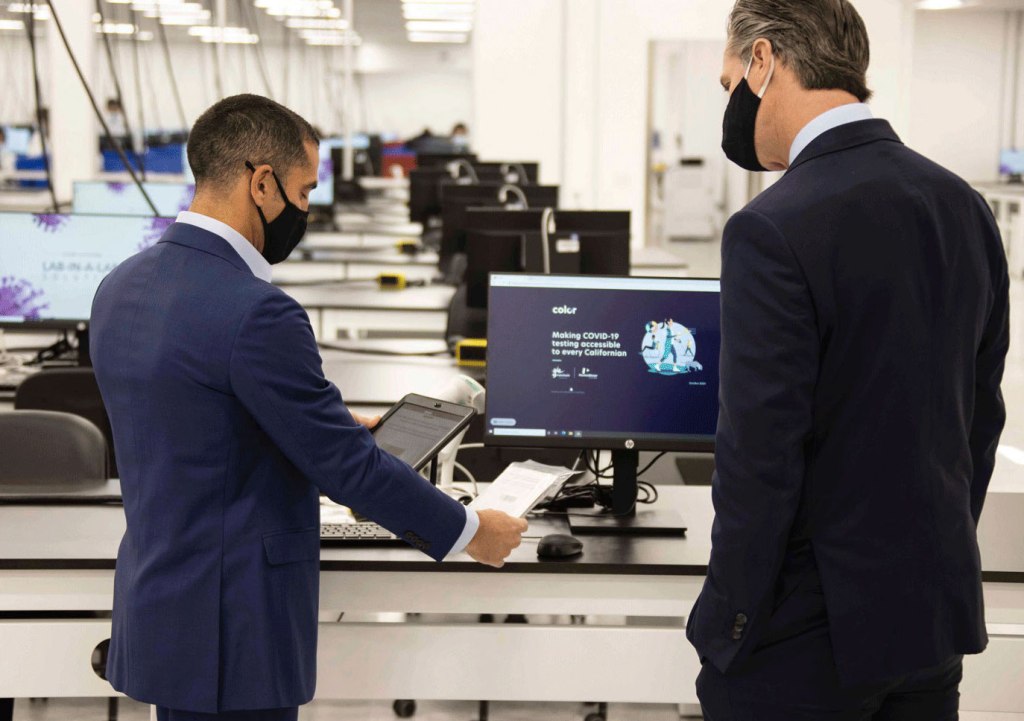Healthcare startup Color has raised a sizable $167 million in Series D funding round, at a valuation of $1.5 billion post-money, the company announced today. This brings the total raised by Color to $278 million, with its latest large round intended to help it build on a record year of growth in 2020 with even more expansion to help put in place key health infrastructure systems across the U.S. — including those related to the “last mile” delivery of COVID-19 vaccines.
This latest investment into Color was led by General Catalyst, and by funds invested by T. Rowe Price, along with participation from Viking Global investors as well as others. Alongside the funding, the company is also bringing on a number of key senior executives, including Claire Vo (formerly of Optimizely) as chief product officer, Emily Reuter (formerly of Uber, where she played a key role in its IPO process) as VP of Strategy and Operations, and Ashley Chandler (formerly of Stripe) as VP of Marketing.
“I think with the [COVID-19] crisis, it’s really shone the light on that lack of infrastructure. We saw it multiple times, with lab testing, with antigen testing and now with vaccines,” Color CEO and co-founder Othman Laraki told me in an interview. “The model that we’ve been developing, that’s been working really well and we feel like this is the opportunity to really scale it in a very major way. I think literally what’s happening is the building of the public health infrastructure for the country that’s starting off from a technology-first model, as opposed to, what ends up happening in a lot of industries, which is you start off taking your existing logistics and assets, and add technology to them.”
Color’s 2020 was a record year for the company, thanks in part to partnerships like the one it formed with San Francisco to establish testing for healthcare workers and residents. Laraki told me they did about five-fold their prior year’s business, and while the company is already set up to grow on its own sustainably based on the revenue it pulls in from customers, its ambitions and plans for 2021 and beyond made this the right time to help it accelerate further with the addition of more capital.
Laraki described Color’s approach as one that is both cost-efficient for the company, and also significant cost-saving for the healthcare providers it works with. He likens their approach to the shift that happened in retail with the move to online sales — and the contribution of one industry heavyweight in particular.
“At some point, you build Amazon — a technology-first stack that’s optimized around access and scale,” Laraki said. “I think that’s literally what we’re seeing now with healthcare. What’s kind of getting catalyzed right now is we’ve been realizing it applies to the COVID crisis, but also, we started actually working on that for prevention and I think actually it’s going to be applying to a huge surface area in healthcare; basically all the aspects of health that are not acute care where you don’t need to show up in hospital.”
Ultimately, Color’s approach is to rethink healthcare delivery in order to “make it accessible at the edge directly in people’s lives,” with “low transaction costs,” in a way that’s “scalable, [and] doesn’t use a lot of clinical resourcing,” Laraki says. He notes that this is actually very possible once you reasses the problem without relying on a lot of accepted knowledge about the way things are done today, which result in a “heavy stack” versus what you actually need to deliver the desired outcomes.
Laraki doesn’t think the problem is easy to solve — on the contrary, he acknowledges that 2021 is likely to be even more difficult and challenging than 2020 in many ways for the healthcare industry, and we’ve already begun to see evidence of that in the many challenges already faced by vaccine distribution and delivery in its initial rollout. But he’s optimistic about Color’s ability to help address those challenges, and to build out a “last mile” delivery system for crucial care that expands accessibility, while also making sure things are done right.
“When you take a step back, doing COVID testing or COVID vaccinations … those are not complex procedures at all — they’re extremely simple procedures,” he said. “What’s hard is doing them massive scale and with a very low transaction cost to the individual and to the system. And that’s a very different tooling.”































Comment